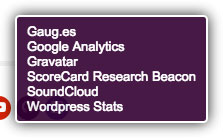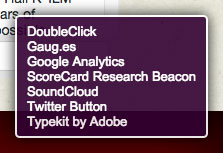I don't always agree with Marco Arment, but his post today about the ethics of modern web ad-blocking really struck a nerve.
As a publisher myself I've been trying to figure out how to monetize my sites so they will at least pay for their own expenses. I'm not trying to turn my podcast into my sole income source, but it would be nice if it wasn't a money pit, y'know? However, I want to support it in a way that's not creepy — I really don't want to track you, and you don't want me to track you, I'm sure.
Recently my wife also was complaining about flashing and otherwise intrusive ads on a “free” game site she frequents. We talked about the ethics of blocking the ads on a free site, and she eventually decided that blocking the ads was worth reducing headaches from flashing and flickering junk on her screen. We installed an ad blocker for Firefox, and not only did the ads go away, but it actually improved the site's performance on her computer (an older white MacBook model). This surprised me at the time, but blocking those JavaScript loads on the page really reduced the amount of work that her browser had to do.
In Marco's article, he recommended the free Ghostery add-on, which installs in your favorite browser and shows a little pop-up of what tracking scripts are running on a given page. It can also block any or all of these, but the most interesting thing for me today has been just to see them, and realize that there was more going on on my own site than I knew.
Let's take a look at what Ghostery is seeing on my own sites.
Station in the Metro
This very site! What's going on here?
- Gaug.es — A web analytics package that shows me what pages people are reading, and what's most popular. It also gives me a rough idea of where people are visiting from (based on your IP address), referral links from other sites, and basic information about your browser, like what platform (Mac, PC, iOS, Android) you're using, screen size, etc.. However, as far as I know, it doesn't track you across multiple sites — it certainly doesn't give me any of that data.
- Google Analytics — I had this enabled because… well, I don't know why honestly. I think I had it installed before I switched to Gaug.es, and never disabled it. Google Analytics is definitely a bit more controversial, since it definitely tracks you across the web via Google ads and web searches. I feel like I get better data and reports on GA vs. Gaug.es, but I'm not sure the creepiness factor is worth it. I should probably remove this.
- Gravatar — A service to give you a global avatar image when you log in to a website. I was about to say I'm pretty sure this is coming up for blog comments, but I disabled comments over a year ago, so… I'm actually not sure why this is coming up. Maybe WordPress is loading some comment code even though it's not displaying them?
- ScoreCard Research Beacon — I honestly don't know what the hell this is. Ghostery's description just says that it's a market research thing, and their own page says “For web tagging, participating websites agree to deploy a special code throughout their sites.” but I never signed up with them, and I don't know why they're on my page. I will have to investigate further.
- SoundCloud — This is for my podcast for which you might see an embedded player at the bottom of the page. Totally legit.
- WordPress Stats — Again, legit tracking of what pages are being read and what's popular. But then again — do I need three separate web stats packages on the same page? I'm sure I can whittle down.
The Optical
This is my podcast site. Some of them are the same, but a few differences:
- DoubleClick - An ad network from Google, which is somewhat troubling, as I am not running any Google ads on the site.
- Twitter Button - Legit little sharing button to share the podcast page on Twitter.
- Typekit by Adobe — Loads in some custom web fonts for the site.
I'm not trying to convince you to run Ghostery or some other ad blocker (or to not run it), but it sure is eye-opening to see what's running on the sites I visit, and even on the sites I run.


